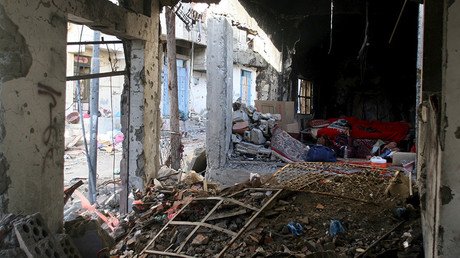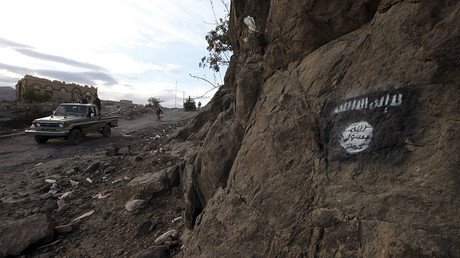UN's Ban Ki-moon admits threats resulted in Saudi-led coalition being removed from blacklist
UN Secretary-General Ban Ki-moon has admitted that his decision to remove the Saudi-led coalition in Yemen from the organization's blacklist came after threats from a number of countries. Human rights groups are urging him to backtrack on the decision.
Ban said on Thursday that temporarily removing the coalition from the blacklist was "one of the most painful and difficult decisions I have had to make," and that it raised “the very real prospect that millions of other children would suffer grievously."
"Children already at risk in Palestine, South Sudan, Syria, Yemen and so many other places would fall further into despair," he told reporters.
The UN secretary-general added that "it is unacceptable for member states to exert undue pressure...scrutiny is a natural and necessary part of the work of the United Nations."
Ban did not specifically mention the Saudi-led coalition in his remarks.
It comes after a diplomatic source told Reuters on condition of anonymity that the UN was faced with “bullying, threats [and] pressure” from Riyadh, adding that it was “real blackmail.”
The source also said there was a threat of “clerics in Riyadh meeting to issue a fatwa against the UN, declaring it anti-Muslim, which would mean no contacts of OIC [Organisation of Islamic Cooperation] members, no relations, contributions, support, to any UN projects [or] programs.”
A fatwa is a legal opinion used in sharia law. In Saudi Arabia, they can only be issued by the group of top, government-appointed clerics and are sometimes commissioned by the ruling family to back up its political positions.
In addition, several diplomatic sources said the UN Relief and Works Agency for Palestine Refugees in the Near East (UNRWA) would be hit especially hard if the blacklisting were upheld. Saudi Arabia was the fourth-biggest donor to the UNRWA last year, supplying it with nearly US$100 million.
However, the Saudi Arabian government denied on Thursday that it had threatened the UN, Al Arabiya reported.
Saudi Arabia's UN envoy, Abdallah Al-Mouallimi, also stated that “we don't use threats or intimidation,” and Riyadh is “very committed to the United Nations.” He also denied any threat of a fatwa, calling the notion "ridiculous" and "outrageous."
The UN's removal of the coalition from the blacklist came on Monday, despite releasing a report the same day which said its campaign had caused 60 percent of child deaths and injuries in Yemen last year, killing 510 and wounding 667. It also blamed the coalition for half the attacks on schools and hospitals.
Speaking to RT, human rights activist Lama Fakih, a senior crisis adviser at Amnesty International, also stressed that the coalition had been responsible for child deaths in Yemen.
“We have seen for example attacks against schools rendering them unusable so that children have not been able to start the academic year. We’ve seen the Saudis also use banned cluster munitions which act as landmines when they are left in civilian areas and are particularly problematic for children, who mistake them for toys and move them around and end up being casualties of these weapons,” she said.
But following the report's release, Mouallimi called the UN's figures “wildly exaggerated” and asked for the report to be “corrected immediately so it does not reflect the accusations that have been made against the coalition and Saudi Arabia in particular.”
“If there are any casualties from the coalition side, they would be far, far lower,” he added.
Meanwhile, rights groups including Human Rights Watch, Amnesty International, and Oxfam wrote a letter to UN Secretary-General Ban Ki-moon on Wednesday, criticizing his decision to remove the coalition from the blacklist.
"If the Saudi-led Coalition wants to be removed from the list, it should stop killing and maiming children and bombing schools and hospitals in Yemen – the violations for which it was listed," the groups wrote, as quoted by Reuters.
They went on to state that the removal undermines “an invaluable tool in efforts to curb violations against children in armed conflict.”
"The list creates pressure on parties to armed conflict to comply with international law. Over 20 governments and armed groups have signed UN action plans and taken steps to end violations against children in order to be considered for 'de-listing,'" the groups continued.
The rights groups involved in the Wednesday letter said the move amounted to Ban capitulating to Saudi Arabia and tainting his legacy before stepping down at the end of the year.
Catherine Shakdam of the Shafaqna Institute of Middle Eastern Studies slammed the way the UN has acted with regards to Saudi Arabia as a double standard, adding that Saudis just don’t see the United Nations as an authority.
“The UN is supposed to represent a political ideal and ensure countries abide by the rules of the international law. So far the Saudis have not played by the rules. Yemen is just holding a mirror to Saudi Arabia and to the kind of violations the Saudis feel they’re entitled to commit because no one will hold them accountable,” she told RT.
“It’s not so much as the Saudi problem, we have a greater problem where the UN is completely [failing] the purpose of its creation which was to create a system in the society where people and countries would feel they have a higher authority.”
Tensions in Yemen escalated after Shiite President Saleh was deposed in 2012 and his Houthi supporters, reportedly aided by Iran, eventually seized the capital city Sanaa in 2014. Houthi forces then advanced from Sanaa towards the south, seizing large parts of Yemen, and sending the current Sunni President Abd-Rabbu Mansour Hadi into exile.
In March 2015, the Saudi-led coalition responded with airstrikes in order to stop Houthi advances and reinstate Hadi back into power. By late summer of that year, the Saudi-led forces had launched a ground operation.
Over 6,500 people were killed in the conflict, including 3,218 civilians, from March 2015 to March 2016, according to the UN.














